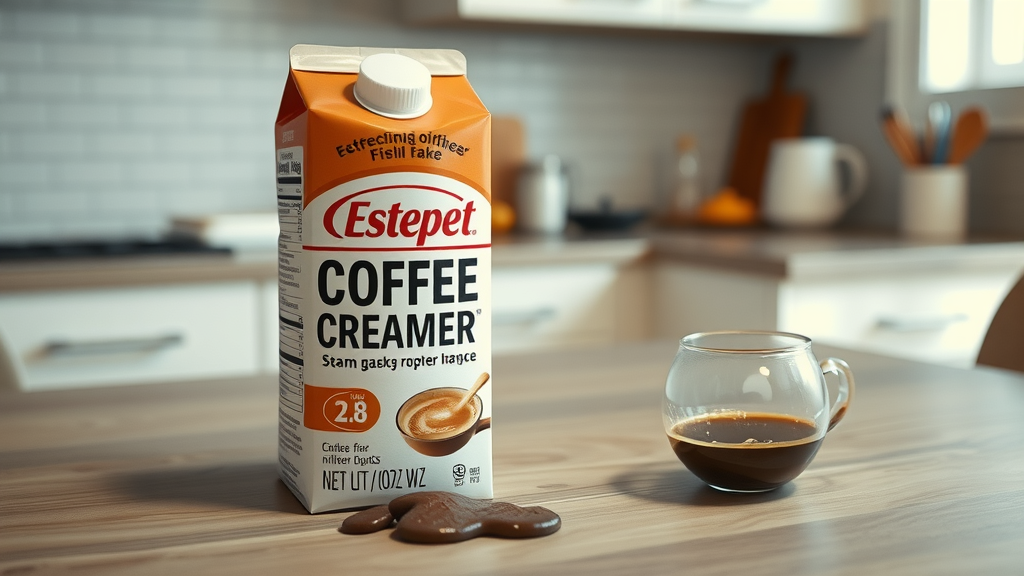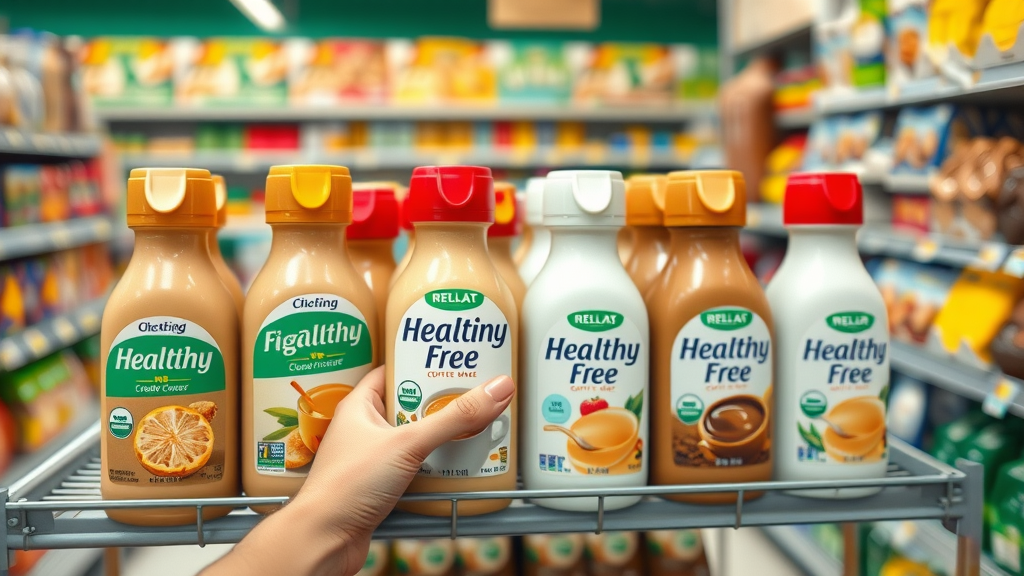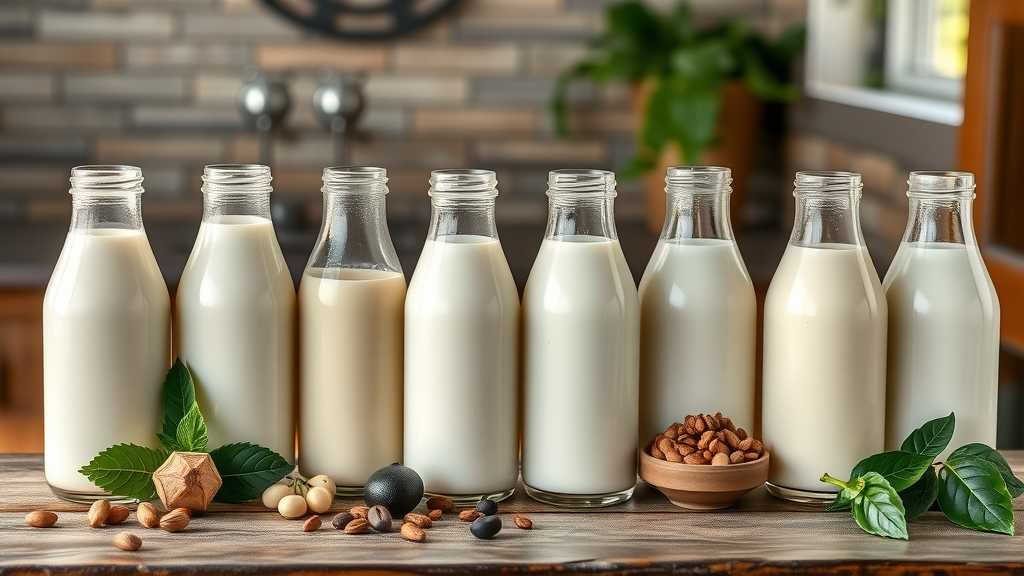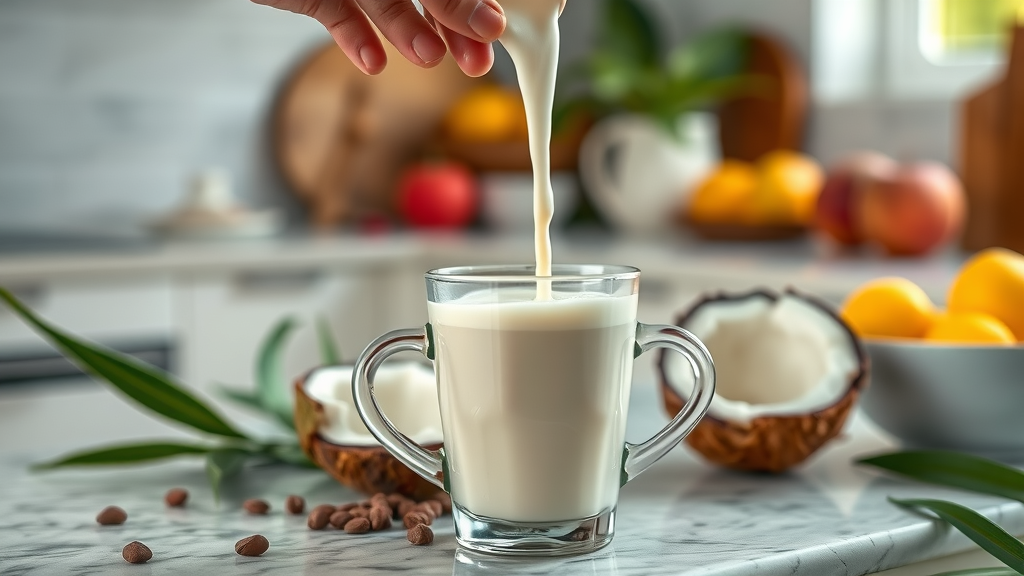
Are you unknowingly adding health risks to your daily cup of coffee? With millions of coffee drinkers worldwide, understanding the potential dangers lurking in your morning coffee creamer is crucial. This article delves into coffee creamer health risks and offers safer, healthier alternatives for your brew. Let's explore how to make a more informed choice about what you stir into your cup.
The Hidden Health Risks of Your Favorite Coffee Creamer
Coffee Creamer: The Allure and Its Risks
Coffee creamers are beloved for their ability to transform a simple cup of joe into a deliciously flavored treat. Yet, the inviting allure of flavors like hazelnut extract and pure vanilla may disguise substances that contribute to significant health risks . Commercial coffee creamers often contain large amounts of added sugar and saturated fats, which can accelerate risks such as heart disease and blood sugar spikes. It's crucial to discern the real deal from mere flavorings often laden with artificial ingredients , such as artificial sweeteners and synthetic additives.
Understanding Added Sugar in Coffee Creamers
The sugar content in many coffee creamers can be shockingly high. Not only does this increase your daily calorie intake, but it also poses concerns for those monitoring their blood sugar levels. Added sugars can sneakily contribute to weight gain and other metabolic disorders when used excessively. Many consumers unknowingly add excessive sugary content to their coffee a day , thinking they are merely enhancing flavor, but the health risk accumulates with each creamy delight.
Harmful Ingredients in Coffee Creamers
Many coffee creamers are also notorious for containing harmful ingredients like soybean oil , guar gum , and artificial ingredients . These components can negatively impact your overall health by introducing unnecessary saturated fats and chemical additives into your diet. For example, emulsifiers and thickeners may improve texture but come at the cost of potentially triggering gastrointestinal irritation and inflammatory reactions. Being aware of these harmful ingredients is the first step in making healthier choices.
What is the Safest Coffee Creamer to Use?

Evaluating Healthier Coffee Creamers
In the quest for a safer coffee creamer , many consumers have turned to options containing natural ingredients instead of synthetic additives. Health-conscious brands prioritize fewer ingredients, often swapping sugar for naturally derived sweeteners or omitting sweeteners altogether. It's essential to scrutinize product labels to ensure they align with dietary goals and health priorities, favoring those decreased in sugar and free from trans fats.
Natural Ingredients vs. Synthetic Additives
The key distinction between healthy and less ideal creamers lies in their composition. Healthy creamers typically utilize natural ingredients like coconut oil, oat, almond, or cashew milk—providing that nut milk alternative with fewer calories and more nutritional value than conventional products. In contrast, synthetic additives prevalent in traditional creamers, such as artificial colors and flavors, can mislead consumers with promises of natural-tasting enhancements, which often disguise the underlying damage they can cause.
What is the Bad Ingredient in Coffee Creamer?
Trans Fats: A Closer Look
Trans fats are one of the most bad ingredients found in non-dairy creamers, contributing significantly to the risk of chronic diseases. Often found in partially hydrogenated oils, these fats can increase LDL cholesterol levels while decreasing HDL cholesterol, which poses severe threats to cardiovascular health. Removing trans fats from one's diet can considerably lower the risk of heart disease and help maintain a more balanced nutritional profile.
Artificial Flavors and Their Impact
Artificial sweetener use is rampant in flavored creamers, offering tantalizingly varied tastes without added calories. However, these may also lead to long-term health implications such as allergies, metabolization issues, or alteration in gut bacteria. While the full impact of artificial flavors and ingredients remains a topic of research, opting for pure vanilla extract or similar natural flavor profiles can provide a safer and equally delightful alternative.
Exploring Safer and Healthier Alternatives

Choosing Nut Milk for Your Coffee
Among the healthier swaps for traditional creamers is nut milk like almond or cashew, which offer the creamy texture that many creamy enthusiasts love without the adverse health effects. These plant-based options are usually fortified with nutrients such as calcium and vitamin D, contributing to daily intake without adding saturated fats or overwhelming caloric values.
The Benefits of Coconut Milk as an Alternative
Coconut milk stands out for its compelling health benefits and creamy consistency. It is rich in medium-chain triglycerides (MCTs), which can aid in boosting metabolism and supporting heart health. By swapping out conventional creamers for coconut milk , you not only reduce the intake of unhealthy substances but positively contribute to your nutritional regimen with each coffee cup.
Pure Vanilla: A Simple and Healthier Choice
For those who seek flavor without the fuss, adding a dash of pure vanilla extract can solace both your health goals and taste buds. This simple addition can enhance your coffee's aroma while avoiding the complications artificial ingredients introduce. When paired with a milk and cream alternative or enjoyed with black coffee, the result is both elegant and satisfying.

What is the Best Alternative for Coffee Creamer?
Exploring Plant-Based Creamers
Plant-based creamers are becoming the cream of the crop, known for their ability to offer flavorful goodness unattached to health risks . Options like oat or soy creamers provide that rich texture sought after in a cup of coffee, while coconut or almond variants can bring distinctive tastes that amplify the drinking experience. These alternatives rely on wholesome ingredients, reducing reliance on sugar and artificial preservatives.
DIY Coffee Creamer Recipes
Creating your own DIY coffee creamer enriches your coffee ritual by allowing for control over ingredients and flavors. DIY options can be concocted using simple household items like almond milk, cinnamon, and natural sweeteners such as honey or maple syrup. The process is not only gratifying but also ensures avoiding artificial ingredients , providing full transparency over what's in your cup.

Why is Creamer Banned in Europe?
Understanding Europe's Stricter Food Regulations
Europe's food safety standards are typically more stringent than in other parts of the world, leading to the banning of certain coffee creamers that fail to meet health benchmarks. These regulations often confront substances linked to adverse effects, such as trans fats and other chemical preservatives banned under European Union laws. The move emphasizes consumer protection, encouraging healthier practices and transparency within the food industry.
Health and Safety Considerations
By barring problematic substances, Europe aims to mitigate potential health hazards related to diet, recognizing the long-term impacts of saturated fats and artificial ingredients . This precautionary approach underscores the need for more robust regulatory frameworks worldwide to ensure food safety and consumer protection, holding companies accountable for the ingredients they utilize.
People Also Ask Section
What is the safest coffee creamer to use?
The safest coffee creamers are those that contain natural ingredients without added sugars or synthetic additives, such as plant-based options like almond or coconut milk.
What is the bad ingredient in coffee creamer?
Trans fats are considered harmful, increasing the risk of heart disease by affecting cholesterol levels. They are often found in non-dairy creamers as partially hydrogenated oils.
What is the best alternative for coffee creamer?
Plant-based options are the best alternatives, offering nutritional benefits without the artificial additives. Variants like coconut and almond milk are popular choices.
Why is creamer banned in Europe?
Certain creamers are banned in Europe due to the presence of trans fats and other synthetic ingredients that do not meet the EU’s strict health and safety regulations.
Summary Table of Coffee Creamer Alternatives
|
Common Coffee Creamer |
Healthier Alternative |
|---|---|
|
Sugar-laden non-dairy creamer |
Almond milk |
|
Trans fat-containing creamer |
Coconut milk |
|
Artificially flavored creamer |
Natural vanilla extract in milk |
Expert Opinions on Coffee Creamers
"While convenience often leads people to reach for commercial coffee creamers, the risks involved with their ingredients shouldn't be overlooked. Consulting a registered dietitian can guide healthier choices." - Nutritionist Insight
Conclusion: Making a Healthier Choice Daily
-
Recognize and avoid harmful ingredients in coffee creamers.
-
Opt for creamers with natural ingredients .
-
Explore DIY recipes for control over additives.
Reconsidering Your Daily Coffee Routine
Reassessing your breakfast rituals starts with what's added to your cup. Replacing high-risk coffee creamers with healthier options supports better long-term wellness.
FAQs on Coffee Creamer and Health Risks
How do I know if my coffee creamer is unhealthy?
Check the nutrition label for high added sugars , presence of trans fats, and artificial additives. Consulting a registered dietitian nutritionist can further assist in making informed choices.
Can I make my own healthy coffee creamer?
Yes, you can make healthy creamer at home using ingredients like nut milk , honey, or pure vanilla extract , customizing flavor and nutritional content.
What are the standard regulations for coffee creamers in the US?
The food and drug administration in the US regulates food products for safety, which includes monitoring ingredients and labeling of coffee creamers .
"Transitioning to healthier coffee options is vital for maintaining balance in your diet and ensuring longer-term health benefits." - A Dietitian's Perspective
Call to Action: Choose Better Coffee Creamers Today
-
Seek out plant-based or low-sugar creamers during your next shopping tour.
-
Experiment with DIY coffee creamer recipes to personalize your coffee experience.
Your browser does not support the video tag.
 Add Row
Add Row  Add
Add 

 Add Row
Add Row  Add
Add 





Write A Comment